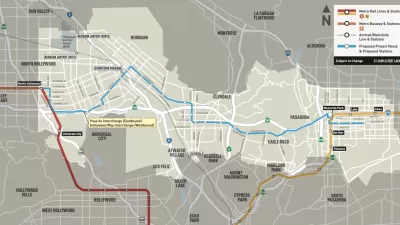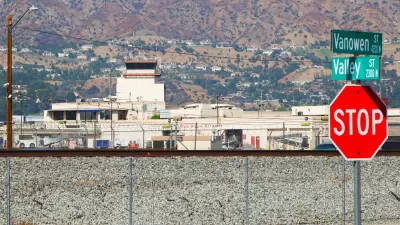In spring of next year, Burbank, CA will debut the nation's first lightweight, zero-emissions bus.
"Designed and fabricated by Colorado-based Proterra, the revolutionary vehicle can travel 250 miles before needing to be recharged, runs at double the fuel economy of a diesel bus and releases nothing but water from the engine exhaust. In addition to being created and built in this country, it relies on power that is 100 percent derived from U.S. sources, thereby reducing dependence on foreign energy."
"The technology is very similar to that used in 2010 next-generation plug-in hybrid vehicles, such as the Chevy Volt. Onboard computers regulate the electrical needs of the engine by alternating between power fed by Proterra's TerraVolt energy storage system, and power derived from the hydrogen fuel cells developed by Hydrogenics Corp. These cells are fed by pressure tanks located on the vehicle's roof, and transform hydrogen and oxygen into water vapor and electricity to charge the batteries. The vehicle may also be recharged by plugging into readily available wall outlets, like many of the new hybrid cars.
'The significance of this milestone program is that we are able to harness the latest transportation technology and put it into service for the public good,' states Johnathan Frank, administrative analyst with the Transportation Department of the city of Burbank. 'Zero-emissions will help the environment, which is a critical issue in Southern California. We're excited to be the first program of its kind in the state.'"
FULL STORY: City of Burbank to Premier World’s First Plug-in Fuel Cell Transit Bus

Alabama: Trump Terminates Settlements for Black Communities Harmed By Raw Sewage
Trump deemed the landmark civil rights agreement “illegal DEI and environmental justice policy.”

Planetizen Federal Action Tracker
A weekly monitor of how Trump’s orders and actions are impacting planners and planning in America.

Why Should We Subsidize Public Transportation?
Many public transit agencies face financial stress due to rising costs, declining fare revenue, and declining subsidies. Transit advocates must provide a strong business case for increasing public transit funding.

Understanding Road Diets
An explainer from Momentum highlights the advantages of reducing vehicle lanes in favor of more bike, transit, and pedestrian infrastructure.

New California Law Regulates Warehouse Pollution
A new law tightens building and emissions regulations for large distribution warehouses to mitigate air pollution and traffic in surrounding communities.

Phoenix Announces Opening Date for Light Rail Extension
The South Central extension will connect South Phoenix to downtown and other major hubs starting on June 7.
Urban Design for Planners 1: Software Tools
This six-course series explores essential urban design concepts using open source software and equips planners with the tools they need to participate fully in the urban design process.
Planning for Universal Design
Learn the tools for implementing Universal Design in planning regulations.
Caltrans
Smith Gee Studio
Institute for Housing and Urban Development Studies (IHS)
City of Grandview
Harvard GSD Executive Education
Toledo-Lucas County Plan Commissions
Salt Lake City
NYU Wagner Graduate School of Public Service




























